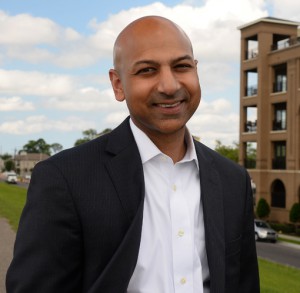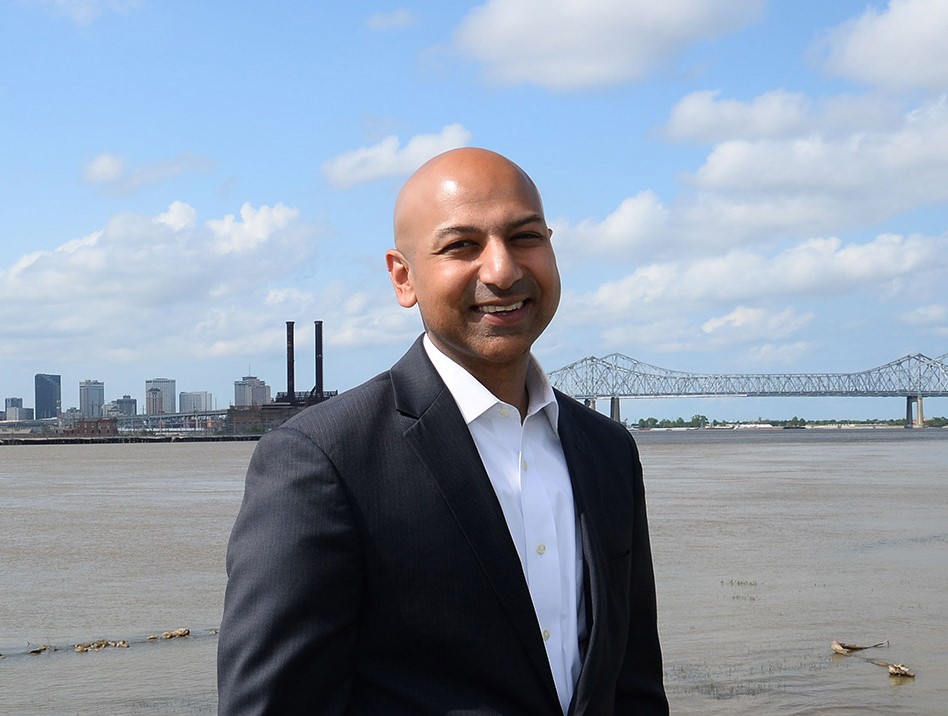
Washington, Aug. 30 – RespectAbility, a nonprofit organization working to empower people with disabilities to achieve the American dream, has asked Senate candidates on both sides of the aisle to fill out a questionnaire on disability issues. Republican hopeful Abhay Patel is one of three candidates for U.S. Senate in Louisiana to have completed the #PwDsVote Disability Campaign Questionnaire for Senate and Gubernatorial Candidates for people with disabilities so far.
RespectAbility is nonpartisan and does not endorse candidates. The questionnaire is purely for educational purposes.
Patel is an individual with a disability.
“Having lived and succeeded with a disability since my teens, I filter every issue through the framework of living with a disability,” Patel responded in his answer to the first question.
Only 31 percent of Louisiana’s 366,000 working-age people with disabilities are employed. This lack of opportunity creates poverty, powerlessness and even can increase the likelihood of developing a mental health condition.
Democrats Foster Campbell and Caroline Fayard also have submitted responses. RespectAbility is seeking responses from the remainder of the candidates in the race and will publish those responses when they are received.
We are presenting Patel’s answers in full below.
QUESTION 1: Do you have designated advisors and clear processes for making decisions on disability issues? If yes, please describe.
ANSWER: Yes, as a person and candidate with a disability, disability issues are always at the forefront of my mind. Having lived and succeeded with a disability since my teens, I filter every issue through the framework of living with a disability. You can learn more about me by going to www.patelforlouisiana.com.
QUESTION 2: Is your campaign accessible and inclusive to people with disabilities? If yes, please describe.
ANSWER: Yes, given my experience with low vision, I strive to ensure all aspects of my campaign are accessible to and inclusive of the disabled community.
QUESTION 3: Do you have a proven record on improving or a plan to improve the lives of people with disabilities? If yes, please describe.
ANSWER: Yes, as a law school student, my family and I purchased and helped grow a large print book business that allows people who have low vision the ability to custom order books, text books and other documents in a large print format.
QUESTION 4: Do you have a plan/commitment to reduce the stigmas about people with disabilities that are barriers to employment, independence and equality? If yes, please describe.
ANSWER: Yes, my career in business and candidacy itself stand as one testament to what those with disabilities can accomplish. I would hope that when elected, I will be able to offer another high profile example of how living with a disability is an opportunity to excel rather than a barrier or limitation.
QUESTION 5: Do you have a proven record on enabling, or a plan to enable, people with disabilities to have jobs, careers and to start their own businesses? Do you have specific strategies for youth employment for people with disabilities and/or sector strategies such as jobs and careers in STEM, hospitality, healthcare and elder care? If yes, please describe.
ANSWER: Yes, having helped lead economic development for the city of New Orleans, I understand what it takes to create, attract and retain business. As Senator, I will work to increase access for those with disabilities to jobs and careers in all sectors.
QUESTION 6: Do you have a plan to enable students with disabilities, including those from historically marginalized communities and backgrounds, to receive the diagnosis, Individualized Education Plan (IEP) and accommodations/services they need to succeed in school and be prepared for competitive employment? If yes, please describe.
ANSWER: Yes, reforming our education system to meet the needs of all of our students is critical to our country’s future success. That begins by taking control of our children’s education away from Washington, D. C., and empowering our state and local governments. No one knows the educational needs of our children better than our communities.
QUESTION 7: Do you have a plan to reform the benefits system (Medicaid, Medicaid buyin) to enable people with disabilities to work to the best of their capacities without losing supports they need to work? If yes, please describe.
ANSWER: Yes, the entitlement system as a whole needs to be reformed. These benefits should be a hand up, rather than a handout.
QUESTION 8: Do you have a plan to ensure people with disabilities are eligible for affordable health insurance regardless of preexisting conditions? If yes, please describe.
ANSWER: Yes, Obamacare must be repealed and replaced with market based solutions, not mandates.
QUESTION 9: Do you have a plan to provide home and community-based services to people with disabilities who would rather live in their own homes instead of institutions, and have the community attendant supports they need to work? If yes, please describe.
ANSWER: Yes, healthcare is a very personal choice for us and loved ones. I believe in market-based solutions to reforming our healthcare system. When a market presents itself, in this case, home and community-based services, solutions arise to meet that demand. By repealing and replacing Obamacare with market based solutions, we can better enable those demands to be met.
QUESTION 10: Do you have a plan to ensure that individuals with disabilities receive services that would prevent them from being swept up into the criminal justice system, divert individuals with disabilities who are arrested to treatment options in lieu of jail where appropriate, receive needed accommodations in the criminal justice process and while incarcerated, and offer appropriate reentry support to help individuals with disabilities leaving jails and prisons reintegrate into their communities and secure jobs? If yes, please describe.
ANSWER: Yes, reform of the criminal justice system is one of the most pressing needs of this generation. We need reforms that enable those who need help to get the assistance they need and ensure that those who pose a danger to society are locked up.
QUESTION 11: People with disabilities are twice as likely to be victims of crime as those without disabilities. People with disabilities also are far more likely to suffer from police violence, partially because manifestations of disability can be misunderstood as defiant behavior. Do you have a plan to address these issues? If yes, please describe.
ANSWER: Yes, our law enforcement community is one of our country’s greatest assets but they have an incredibly tough job. We need to empower our local leaders with the tools they need to equip our law enforcement officers with the training to identify and differentiate those who may need assistance from those who pose a danger.
QUESTION 12: Both children and adults with disabilities are more likely to be victims of rape or sexual assault. Do you have a plan to address this issue? If yes, please describe.
ANSWER: Yes, sexual assault on any person, especially children, is a heinous crime. Tougher laws, enforcement, investigation and penalties for these crimes are a priority in reforming our criminal justice system.
QUESTION 13: Do you have a plan for veterans with disabilities facing barriers transitioning from active duty to civilian employment? If yes, please describe.
ANSWER: Yes, veterans are owed every ounce of support we as a country can provide them for their service. We must retool the entire Veterans Affairs system to ensure that all needs of those transitioning out of service into civilian life are met.
QUESTION 14: Do you have a plan for accessible, affordable, integrated housing to allow people with disabilities to live in the communities where they work or are seeking work? If yes, please describe.
ANSWER: Yes, affordable and accessible housing is a key barrier to advancement in our country. We must lean on local and market-oriented solutions to ensure that housing stock for all ability and socio-economic levels are available and adequate.
QUESTION 15: Do you have a plan to address the lack of accessible transportation options that is a barrier to work for people with disabilities? If yes, please describe.
ANSWER: Yes, mobility and transportation options are a true limiting factor on one’s ability to earn a living. Again, we must incentivize the market to ensure these demands are met.
QUESTION 16: Do you have a plan to advance innovations (i.e., assistive technologies, devices) that can help people with disabilities become more successfully employed, productive and independent? If yes, please describe.
ANSWER: Yes, technology and innovation are truly able to level many playing fields in our society. As someone with low vision who cannot drive, I depend on innovations in the marketplace (like Uber) to enable me to access the transportation options I need. We must foster an environment that continues to support these innovations that assist all segments of society.
QUESTION 17: In your foreign policy and national security plan, do you plan to continue America’s tradition of standing up for the rights of oppressed people, including people with disabilities, around the world? If yes, please describe.
ANSWER: Yes, the United States should lead a global coalition that will be relentless in keeping America, Israel and all of our allies safe. Ronald Reagan promoted “peace through strength.” He was right. As your Senator, I will work to rebuild our military and ensure that we have the strongest, most capable fighting force available.
RespectAbility has asked all the candidates for Senator on both sides of the aisle to complete the same questionnaire. We will share responses from additional campaigns as we receive them.
The RespectAbility Report is a nonpartisan political commentary on the 2016 U.S. elections with a focus on disability issues. The RespectAbility Report has covered all of the Democratic and Republican candidates for president and has begun coverage of down ballot candidates. Coverage can be found at http://therespectabilityreport.org/. The RespectAbility Report is nonpartisan and does not endorse candidates.

[…] Louisiana’s Patel Completes #PwDsVote Senate Campaign Questionnaire […]
[…] Louisiana’s Patel Completes #PwDsVote Senate Campaign Questionnaire […]